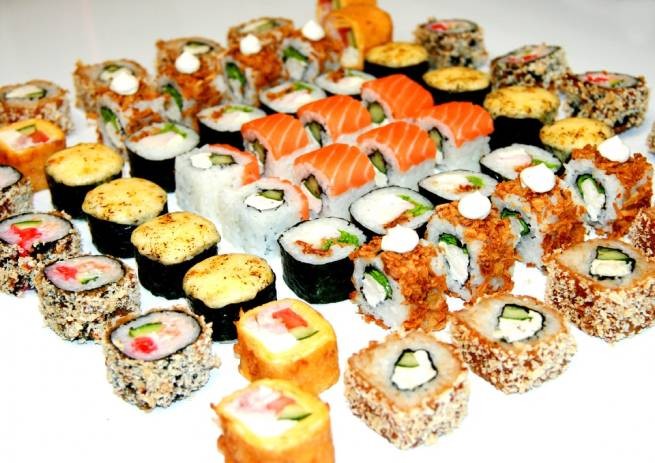Traditional Japanese dishes, rolls and sushi, are gaining more and more admirers in our country, and their delivery is a popular and in-demand service. Are overseas delicacies healthy, and does Japanese longevity really depend, among other things, on their consumption?
Some people disliked them from the first tasting and stubbornly defend their point of view. But, you see, it is difficult to refute the benefits of natural ingredients that make up sushi and rolls. The flourishing appearance and enviable longevity of the Japanese who adore these delicacies convincingly testify to their usefulness. Let’s try to figure it out.
What are the benefits of rolls and sushi
Despite the variety of assortment and large selection, differences in cooking technology, all Japanese delicacies have a similar composition – a little rice, seafood, vegetable components (seaweed, vegetables, ginger). Each ingredient contributes to the usefulness of the finished product:
- rice is a source of vitamins and minerals, amino acids and proteins, iron and fiber. It normalizes the digestive process and strengthens muscles;
- sea fish generously provides the body with Omega-3 and Omega-6 (polyunsaturated fatty acids), B vitamins, potassium, and magnesium. Due to the unique composition of nutrients, seafood has a beneficial effect on the cardiovascular system, promotes mental activity, and prevents the development of atherosclerosis;
- ginger is an excellent immunostimulant and antioxidant;
- soy sauce is the original seasoning. Prepared according to all the rules, it contains a lot of vitamins, amino acids, macro- and microelements;
- nori seaweed – a source of iron, calcium and iodine;
- Wasabi is an excellent antioxidant and source of vitamin C, protects teeth from caries.
Rice and fish are products that go well together; supporters of a separate diet eat them with pleasure. The low calorie content of Japanese delicacies allows you to use them once a week as a fasting diet.
A few words to supporters of the harmfulness of rolls and sushi
Like some other products, the dishes of Japanese cuisine beloved by many are not recommended only for allergy sufferers – red fish, for example, can cause an undesirable reaction. Another danger is purchasing sushi from dubious establishments. If you want to enjoy the exquisite taste of delicacies, order them only from establishments with a proven reputation.
Advice from nutritionists
According to nutritionists, it is better to eat sushi and rolls no more than once a week. The daily dose is 400 g. It is advisable to eat them for lunch, but definitely not to eat sushi for dinner, and especially not at night. Rice is a heavy food for the gastrointestinal tract and puts a strain on the digestive system, which can cause insomnia. At night, our body must rest, this also applies to the digestive system. In order for sushi to be healthy for the body, it must be eaten together with a vegetable side dish or salad – fiber helps the functioning of the gastrointestinal tract. And a few more recommendations:
- Sushi consumption should be limited in the presence of diseases such as diabetes, gastritis, cholecystitis, pancreatitis and pathologies of the gastrointestinal tract, acute infectious diseases.
- Rolls and sushi, purchased in a store or prepared independently, should be stored in the home refrigerator for no more than 1 day; unopened packaging of products from the store must be used within the expiration date indicated on the label.
- When purchasing ready-made sushi and rolls in a store, pay attention to the storage conditions – they must correspond to those indicated by the manufacturer on the label, expiration dates, and the condition of the packaging – it must be sealed, not swollen, without traces of leaks.
It is recommended to order ready-made food at home in places that are well known to you, where you have already been and tried the products. Select the restaurant closest to you, preferably one in your area. Before placing an order, call the restaurant’s phone number, not the one listed on the website, and check whether they deliver products to order and whether the phone number listed on the website is correct.







More Stories
May Day strikes throughout Greece, operating hours of public transport are limited to the maximum (additions are being added)
Who likes an adventure holiday?
Identification of Ukrainian pensioners-2024: 4 ways to avoid being left without money